They aren't Apple products, although there are some relevant
computer connections we'll look at below, but they're really cool. I'm
talking about bicycles made using bamboo - and laptop computers.

Bicycling on snow and ice.
I'm a bicycle fan. I used to do a lot of bike riding, year round. If
you'll pardon a digression, winter biking, which I did daily in season
when our rural mailbox was a kilometre away, can be a lot of fun,
especially cross country on the top of well-crusted snow or on frozen
lakes. It's also less tricky that you might think, since bikes don't
depend as much on surface traction for stability as four- or
three-wheeled vehicles do and are surprisingly capable on ice. I don't
recall ever wiping out in several years of fairly intensive winter
biking,
 These shots show one of my kids on the crust back in 1990.
These shots show one of my kids on the crust back in 1990.
I haven't done much bicycling in winter in recent years. The mail
gets delivered to the foot of our driveway these days, and being just
two years and a bit short of 60, I've slowed down a bit, but I still
use my old five-speed tourer for trips to the beach in summer and
general errand-running.
 Winter biking isn't what this
column is about either, the actual topic being a group of
bicycle-enthusiast friends in Fort Collins, Colorado, who are on the
verge of launching a moderately priced line of bicycles made not from
the customary aluminum or steel tubing, but from the natural,
renewable, sustainable material bamboo.
Winter biking isn't what this
column is about either, the actual topic being a group of
bicycle-enthusiast friends in Fort Collins, Colorado, who are on the
verge of launching a moderately priced line of bicycles made not from
the customary aluminum or steel tubing, but from the natural,
renewable, sustainable material bamboo.
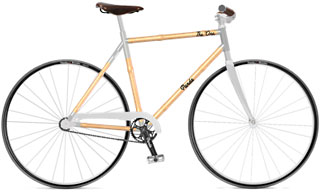 The
bamboo Panda Bikes are claimed to be
durable and comfortable, and they are certainly beautiful. The company
says that the species of bamboo they use is very strong with a
strength-to-weight ratio similar to that of steel. The robustness of
this bamboo - combining the strength of steel, the weight of aluminum,
and the vibration dampening of carbon fibre - merged with quality metal
mechanical components and some metal frame components, such as front
forks, handlebars, and seat posts, will make the Panda Bike a sleek and
durable form of transportation. It will be perfect for urban commuters,
say the three Panda partners - Jacob Castillo, John McKinney, and Mark
Schlink - who are alumni of Colorado State University's global social
sustainable enterprise program.
The
bamboo Panda Bikes are claimed to be
durable and comfortable, and they are certainly beautiful. The company
says that the species of bamboo they use is very strong with a
strength-to-weight ratio similar to that of steel. The robustness of
this bamboo - combining the strength of steel, the weight of aluminum,
and the vibration dampening of carbon fibre - merged with quality metal
mechanical components and some metal frame components, such as front
forks, handlebars, and seat posts, will make the Panda Bike a sleek and
durable form of transportation. It will be perfect for urban commuters,
say the three Panda partners - Jacob Castillo, John McKinney, and Mark
Schlink - who are alumni of Colorado State University's global social
sustainable enterprise program.
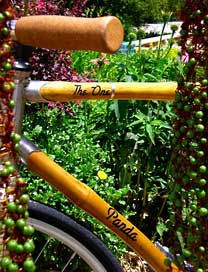 Bamboo is a
fast-growing, cheap, renewable, and plentiful resource that is used
extensively as an engineering and construction material in its native
Asia. It has the tremendous advantage of 3 to 5 year regeneration time
(compared with 80 to 200 years for hardwood). Bamboo has been known to
grow 60 cm (24") in just 24 hours and is also capable of regenerating
itself upon harvesting without need for manual replanting, making it an
effortlessly renewable resource.
Bamboo is a
fast-growing, cheap, renewable, and plentiful resource that is used
extensively as an engineering and construction material in its native
Asia. It has the tremendous advantage of 3 to 5 year regeneration time
(compared with 80 to 200 years for hardwood). Bamboo has been known to
grow 60 cm (24") in just 24 hours and is also capable of regenerating
itself upon harvesting without need for manual replanting, making it an
effortlessly renewable resource.
Panda Bicycles will not be the first to build bamboo bikes. New
York-based Bamboo Bike
Studio has been at it for some time, with its mission of advancing
sustainable entrepreneurship and development through financing bamboo
bike factories in Africa and South America. It has seeded the first
bamboo bike factory in Ghana, Africa, where reliable and cheap bicycle
transportation can dramatically improve access to jobs, commerce,
education, basic food and water resources, and health care.
Bamboo is a fascinating material, amazingly strong for its weight -
and quite attractive aesthetically as well. When I was a kid, we had
several bamboo poles around the house that had arrived with carpet
rolled around them.
The ASUS Bamboo Series Notebook
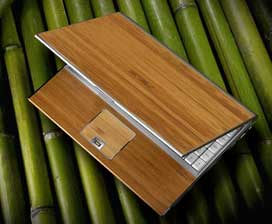 They're not Macs, but ASUS last fall rolled out its
U6V bamboo notebook as a showcase for ASUS' commitment to
environmentally friendly "green computing". ASUS claims this machine is
the world's first notebook that largely foregoes hard materials such as
plastic and metal in favor of all-natural bamboo, which is, as noted
above, renewable and abundant, as well as a pleasure to touch and
feel.
They're not Macs, but ASUS last fall rolled out its
U6V bamboo notebook as a showcase for ASUS' commitment to
environmentally friendly "green computing". ASUS claims this machine is
the world's first notebook that largely foregoes hard materials such as
plastic and metal in favor of all-natural bamboo, which is, as noted
above, renewable and abundant, as well as a pleasure to touch and
feel.
The U6V Bamboo's palm rest, touchpad and LCD cover are covered in
bamboo, giving the laptop a distinct look to say the least while the
computer inside is also energy efficient and has achieved Energy Star
certification.
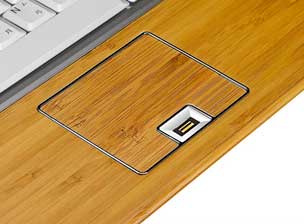 ASUS says the organic tactility, refreshing scent and
minimalist aesthetics of bamboo lend the Bamboo Series notebook an
arresting aura of spirituality, warmth and old world charm that
synthetic materials and cold, impersonal metals will struggle to
replicate. With every touch, users will be able to feel the difference
- the bamboo gives an instant sense of familiarity, just like the
sensation one would get from running one's fingertips across fine
furniture. I haven't used a Bamboo computer, but I don't doubt the
claim, and have ruminated in this space about the importance of
computer feel as well as performance.
ASUS says the organic tactility, refreshing scent and
minimalist aesthetics of bamboo lend the Bamboo Series notebook an
arresting aura of spirituality, warmth and old world charm that
synthetic materials and cold, impersonal metals will struggle to
replicate. With every touch, users will be able to feel the difference
- the bamboo gives an instant sense of familiarity, just like the
sensation one would get from running one's fingertips across fine
furniture. I haven't used a Bamboo computer, but I don't doubt the
claim, and have ruminated in this space about the importance of
computer feel as well as performance.
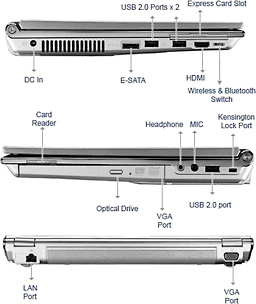 The Bamboo Series notebook isn't just a design exercise, but a
highly capable computer with a full array of ports and an Express Card
slot.
The Bamboo Series notebook isn't just a design exercise, but a
highly capable computer with a full array of ports and an Express Card
slot.
ASUS offers further enhancement of individuality by offering
optional treatments that yield different colors, or by laser etching
distinctive designs onto the ASUS Bamboo Series notebook's bamboo-clad
cover.
Bamboo has immense tensile strength that rivals that of many metal
alloys, and the ASUS Bamboo notebook is also highly resilient, claimed
to be the first notebook to have survived the unforgiving conditions of
8,848 meters (29,028 feet) up snowcapped Qomolangma Peak.
Bamboo iPhone Cases
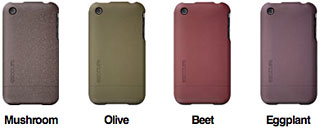 Incase also makes a pretty cool Bamboo case called Bamboo Slider for iPhone
3GS and iPhone 3G. 40% of the Bamboo Slider is made of a bamboo pulp
created from reclaimed bamboo shards of materials such as construction
scaffolding and chopsticks. The new material make-up provides the same
high level of protection Incase's regular Slider Cases are known for,
while allowing them to reduce the amount of plastic used.
Incase also makes a pretty cool Bamboo case called Bamboo Slider for iPhone
3GS and iPhone 3G. 40% of the Bamboo Slider is made of a bamboo pulp
created from reclaimed bamboo shards of materials such as construction
scaffolding and chopsticks. The new material make-up provides the same
high level of protection Incase's regular Slider Cases are known for,
while allowing them to reduce the amount of plastic used.
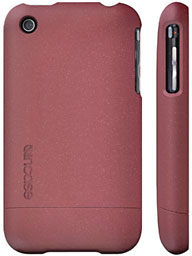 Bamboo Slider Features
Bamboo Slider Features
- Durable iPhone 3GS and iPhone 3G protection
- 40 percent recycled bamboo, 60 percent polycarbonate
construction
- Direct access to iPhone widescreen
- Easy access to all controls and device features
- Allows charging while in case or bottom cover slides away for use
with dock
Other Bamboo Transportation
There are even bamboo cars, trucks, and taxis fueled with fueled by
biodiesel produced from coconut oil being built and used in the
Philippines, according to
an article on Autoblog Green (with photos).
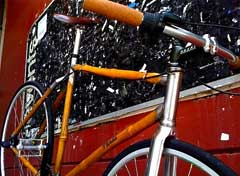 But back to the bamboo
bikes.
But back to the bamboo
bikes.
Panda Bikes' first product, "The One", is projected to be available
in about six weeks and is designed to be offered as a "fixie" - that
is, a single speed - or three speed featuring an internal hub and
coaster brake for maximum durability and style at a reasonably
affordable price.
The estimated retail price for The One is to be about $850.
Distribution will be through bike shops across the US, and eventually
Canada as well.


 These shots show one of my kids on the crust back in 1990.
These shots show one of my kids on the crust back in 1990. Winter biking isn't what this
column is about either, the actual topic being a group of
bicycle-enthusiast friends in Fort Collins, Colorado, who are on the
verge of launching a moderately priced line of bicycles made not from
the customary aluminum or steel tubing, but from the natural,
renewable, sustainable material bamboo.
Winter biking isn't what this
column is about either, the actual topic being a group of
bicycle-enthusiast friends in Fort Collins, Colorado, who are on the
verge of launching a moderately priced line of bicycles made not from
the customary aluminum or steel tubing, but from the natural,
renewable, sustainable material bamboo. The
bamboo
The
bamboo  Bamboo is a
fast-growing, cheap, renewable, and plentiful resource that is used
extensively as an engineering and construction material in its native
Asia. It has the tremendous advantage of 3 to 5 year regeneration time
(compared with 80 to 200 years for hardwood). Bamboo has been known to
grow 60 cm (24") in just 24 hours and is also capable of regenerating
itself upon harvesting without need for manual replanting, making it an
effortlessly renewable resource.
Bamboo is a
fast-growing, cheap, renewable, and plentiful resource that is used
extensively as an engineering and construction material in its native
Asia. It has the tremendous advantage of 3 to 5 year regeneration time
(compared with 80 to 200 years for hardwood). Bamboo has been known to
grow 60 cm (24") in just 24 hours and is also capable of regenerating
itself upon harvesting without need for manual replanting, making it an
effortlessly renewable resource. They're not Macs, but ASUS last fall rolled out its
They're not Macs, but ASUS last fall rolled out its  ASUS says the organic tactility, refreshing scent and
minimalist aesthetics of bamboo lend the Bamboo Series notebook an
arresting aura of spirituality, warmth and old world charm that
synthetic materials and cold, impersonal metals will struggle to
replicate. With every touch, users will be able to feel the difference
- the bamboo gives an instant sense of familiarity, just like the
sensation one would get from running one's fingertips across fine
furniture. I haven't used a Bamboo computer, but I don't doubt the
claim, and have ruminated in this space about the importance of
computer feel as well as performance.
ASUS says the organic tactility, refreshing scent and
minimalist aesthetics of bamboo lend the Bamboo Series notebook an
arresting aura of spirituality, warmth and old world charm that
synthetic materials and cold, impersonal metals will struggle to
replicate. With every touch, users will be able to feel the difference
- the bamboo gives an instant sense of familiarity, just like the
sensation one would get from running one's fingertips across fine
furniture. I haven't used a Bamboo computer, but I don't doubt the
claim, and have ruminated in this space about the importance of
computer feel as well as performance. The Bamboo Series notebook isn't just a design exercise, but a
highly capable computer with a full array of ports and an Express Card
slot.
The Bamboo Series notebook isn't just a design exercise, but a
highly capable computer with a full array of ports and an Express Card
slot. Incase also makes a pretty cool Bamboo case called
Incase also makes a pretty cool Bamboo case called  Bamboo Slider Features
Bamboo Slider Features But back to the bamboo
bikes.
But back to the bamboo
bikes.
